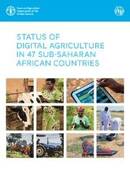Publicaciones
Sub-Saharan Africa is uniquely positioned significantly increase its current agricultural productivity to lift the region’s more than 400 million people out of extreme poverty and improve the livelihood of approximately 250 million smallholder farmers and pastoralists in the region. To achieve that, substantive digital transformation of the agriculture sector is required through improved infrastructure and increased access to and use of digital technologies for agriculture. To improve the current understanding of sub-Saharan Africa’s digital agriculture landscape, the Food and Agriculture Organization of the United Nations (FAO) and the International Telecommunication Union (ITU) undertook this study in 47 countries. The report...
Since 2017, in line with COAG’s recommendation, the Research and Extension Unit engaged in the development of a participatory AIS assessment framework including a customizable toolbox for countries with a totally new capacity development perspective. The assessment framework is meant for actors of the national agricultural innovation systems, i.e. research, extension and advisory services, innovation support service providers and universities, policy and decision makers, or development organizations, with a mandate or willingness to catalyze system innovation processes and to identify entry points for developing capacities to innovate in a a sector, a value chain, a territory or at country level....
Multi-actors innovation platforms (MAIPs) are increasingly deployed as a model for participatory and inclusive innovation to address the challenges of sustainability in complex systems like the agri-food systems. The facilitation of co-innovation and multi-actor partnerships is critical to the success of MAIPs, as a common lesson learned across the multitude of initiatives around the world. The guideline was developed for Master Trainers to train MAIP facilitators. The guideline first gives an introduction to the definiton, principles, design, establishment and facilitation of MAIPs. Then, it explains the principles, curriculum development and preparation, and implementation, monitoring and evaluation of MAIP training of...
Extension and advisory services (EAS) play a key role in facilitating innovation processes, empowering marginalized groups through capacity development, and linking farmers with markets. Advisory services are increasingly provided by a range of actors and funded from diverse sources. With the broadened scope of EAS and the growing complexity of the system, the quantitative performance indicators used in the past (e.g. related to investment, staffing or productivity) are not adequate anymore to understand whether the system is well-functioning.
To enable evidence based and informed policy and investment decision for extension and advisory systems, the EAS-Yardstick (EAS-Y) has been developed through...
This policy brief is aimed to serve as a framework for policy-makers to formulate and tailor reform policies of public EAS systems. To this end, it provides a set of priority areas of reform action, including reviewing and assessing existing public EAS systems; strengthening legal and policy frameworks; reforming mandates of public agricultural EAS; ensuring essential public EAS services accessible; enhancing downward accountability of public EAS; strengthening multi-stakeholder coordination; developing an effective human resource development system; sustaining the adequacy of financial resources; investing in a continued way; and monitoring and evaluating the performance of public EAS systems.





